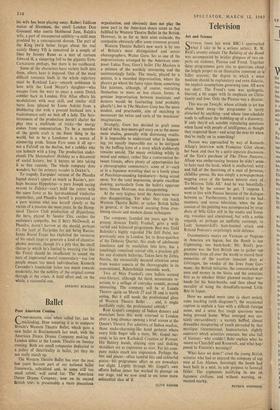Ballet
Poor American Cousins
OMPARISONS, even when called for, can be ‘,./misleading. How tempting it is to compare Britain's Western Theatre Ballet, which gave a new ballet in Bournemouth last week, with the American Dance Drama Company making its London'ddbut at the Lamda Theatre on Sunday evening. Both are small companies dedicated to a policy of theatricality in ballet, yet they do not really match up.
The Western Theatre Ballet has over the past few 'years become part of our national ballet framework, subsidised and, to some still too small extent, well cared for. The American Dance Drama Company, now on its second British tour, is presumably a more precarious org,aaisation, and obviously does not play the same part in the American dance scene as that fulfilled by Western Theatre Ballet in the British. However, in so far as their aims coincide, the companies obviously offer some common ground.
Western Theatre Ballet's new work is by one of Britain's most distinguished and senior choreographers, Walter Gore. Set to one of the improvisations arranged by the American com- poser Lukas Foss, Gore's ballet The Maskers is a mixture of the worthily interesting and the uninterestingly futile. The music, played by a quintet, is a recorded improvisation, where the players go where the fancy takes them, something like jazzmen, although, of course, restricting themselves to more or less classic forms. A genuine improvisation between musicians and dancers would be fascinating (and probably ghastly!), but in The Maskers Gore has the more modest, and practicable, aim of matching in movement the twists and curls of The musicians' imaginations.
Strangely, Gore has decided to graft some kind of thin, boy-meets-girl story on to the move- ment studies, generally with distressing results. It is impossible to understand what is happen- ing, yet equally impossible not to be intrigued by the baffling hints of a story which stubbornly remains untold. The music switching wildly in mood and subject, rather like a conversation be- tween friends, offers plenty of opportunities for a choreographic commentary, some of it—such as in a Japanese wrestling duet to a lovely piece of Puccinian-sounding lepidoptery—being seized upon. Yet the total impression, despite excellent dancing, particularly from the ballet's apparent hero, Simon Mottram, was disappointing.
At the very highest level the Americans were also disappointing. Yet what they can teach Western Theatre Ballet, or rather British ballet in general, is the reward accruing from com- bining classic and modern dance techniques.
The company, founded ten years ago by its present director Emily Frankel, gave a well- varied and balanced programme. Best was Todd
Bolender's highly regarded The Still Point, not previously seen in London. Set to three-quarters
of the Debussy Quartet, this study of adolescent loneliness and its resolution into love, has a touchingly conceived central role, a precious gift for any dramatic ballerina. Taken here by Zebra Nevins, she successfully decoyed attention away from weaker aspects of the choreography in its conventional, Balanchinian ensemble work.
Two of Miss Frankel's own ballets seemed over-literary, although the third, movements re- actions to a collage of everyday sounds, proved interesting. The company will be at Lamda Theatre again on March 27 and 28 and is worth seeing. But it still needs the professional gloss of Western Theatre Ballet . . . and, it might justifiably reply, the professional subsidy!
Gopars company of Indian dancers and musicians have this week returned to London after a long absence opening a brief season at the Queen's Theatre. For admirers of Indian mudras, those snake-charming-like hand gestures where every little finger tells a story, Mr. Gopal suc- ceeds in his new Kathakali Creation of Woman. His fluttery hands, dilating eyes and shaking shoulders are as expressive as ever. Yet his com- pany makes much less irnpression. Perhaps the bits and pieces—often tasteful bits and colourful pieces—his programme offers us are nowadays too slight. Largely through Mr. Gopal's own efforts Indian dance has worked its passage on our stage, and we now need to see some more substantial slice of it.
CLIVE BARNES


































 Previous page
Previous page